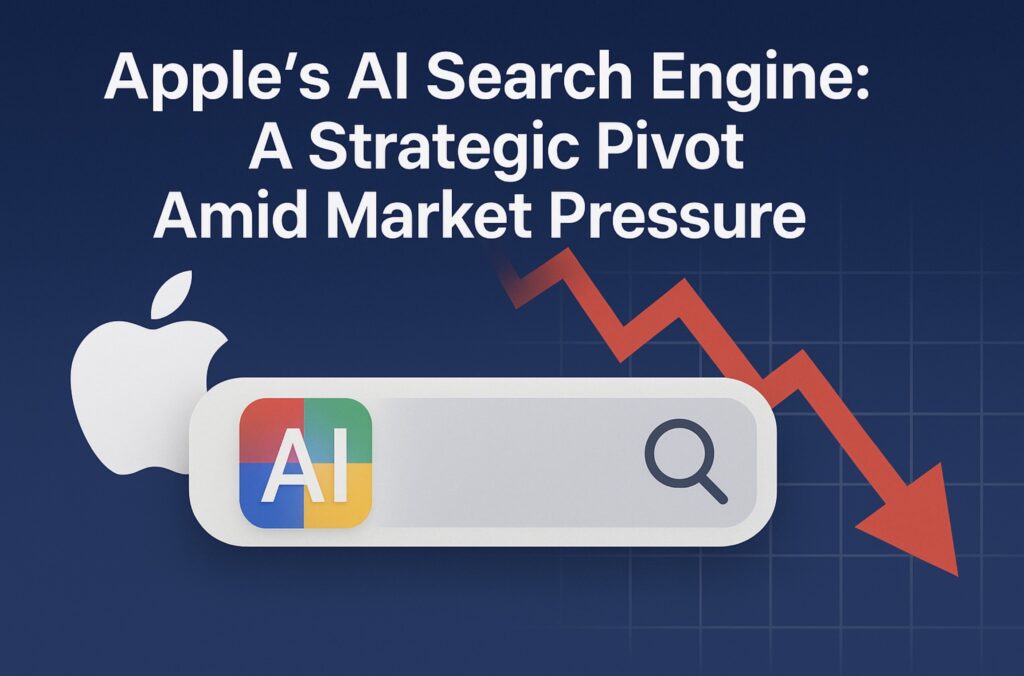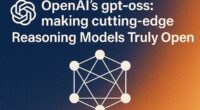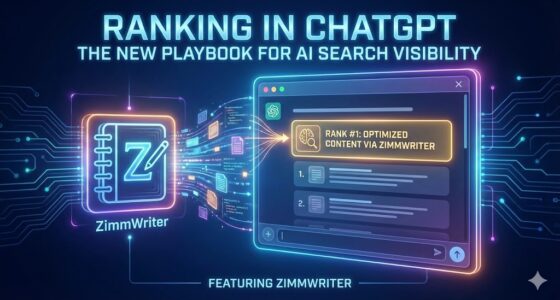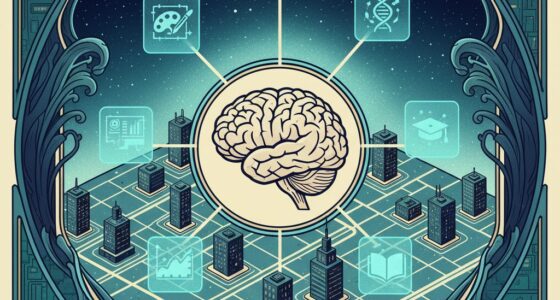Background – from Third‑Party Reliance to AI Search Ambitions
For most of the last two decades Apple has outsourced web search. Its default search deal with Google, reportedly worth about US$20 billion per year, made Google the default search engine in Safari and Siri and delivered a steady revenue stream thekeyword.co. Apple previously integrated external generative‑AI tools: Siri can forward queries to ChatGPT, and Apple Intelligence (a suite of on‑device AI tools introduced at WWDC 2024) relies on third‑party models. However, Apple had not built its own AI search product digitalinformationworld.com.
That is changing. Multiple reports in August 2025 reveal that Apple quietly created an Answers, Knowledge and Information (AKI) team to build a proprietary answer engine. Bloomberg’s Mark Gurman first reported that the AKI team is designing a “ChatGPT‑like” AI search system that can crawl the web and answer users’ general‑knowledge questions macrumors.com. The project may manifest as a stand‑alone app or as new back‑end infrastructure powering Siri, Safari and Spotlight macrumors.com. Apple’s job listings for the AKI team emphasise search‑algorithm expertise and engine development macrumors.com, signalling a move beyond simple integration toward ownership of the core technology.
Market Pressures Triggering the Pivot
Decline in traditional search usage
Generative‑AI chatbots like ChatGPT and Google’s Gemini have changed how people look up information. Reports suggest that nearly 40 % of users now turn to AI chatbots instead of conventional search enginesdigitalinformationworld.com. This shift is impacting Apple’s ecosystem. Safari searches declined for the first time in 22 years, as Apple Senior Vice President Eddy Cue told a U.S. federal court in May 2025 thekeyword.co. Cue attributed the drop to users moving to AI‑powered tools like ChatGPT, stating that he believes AI search providers will eventually replace standard search engines thekeyword.co. The decline has triggered internal debates at Apple over its reliance on Google and whether it needs a new strategy thekeyword.co.

Regulatory and competitive headwinds
Apple’s lucrative search deal with Google is under legal scrutiny. The U.S. Justice Department’s antitrust case against Google seeks to stop default search agreements and could force Google to sell off Chrome, potentially jeopardizing the revenue Apple earns from the partnershipthekeyword.co. Apple executives have openly acknowledged that losing the Google deal would significantly hurt services revenue and that they have “lost a lot of sleep” over this possibilitythekeyword.co. At the same time, Apple is exploring partnerships with AI‑search companies like Perplexity and Anthropic and has integrated ChatGPT into Sirithekeyword.co, but such partnerships are unlikely to fully replace the revenue from Google’s search agreement.
Growing user expectations
With chat‑based search becoming a key differentiator, competing platforms such as Perplexity AI, Google’s Gemini, OpenAI’s ChatGPT, and Anthropic’s Claude are rolling out features that can summarize documents, cite sources and perform interactive tasks. Apple’s investors and analysts have criticized the company for lagging in generative AI and worry that it is missing a critical market opportunity. A PYMNTS article noted that Apple’s AI efforts do not appear in public Gen‑AI rankings and that the company is betting on catching up by integrating OpenAI models into Siripymnts.com. CEO Tim Cook has acknowledged that Apple needs to “significantly” increase AI investments and has promised more AI features for Siri in 2026pymnts.com.
Apple’s Internal Response
Formation of the AKI team and hiring spree
Apple’s AKI unit is led by Robby Walker, a senior director formerly responsible for Siri. The team is tasked with prototyping the answer engine and building the infrastructure to integrate it across Apple’s software stacknotebookcheck.net. Apple’s careers page currently lists multiple positions for the AKI team across the U.S. and China, including Staff Machine Learning Engineer roles aimed at improving Siri’s ability to answer personal‑domain questionsmacrumors.com. Job descriptions highlight “intuitive information experiences” across Siri, Spotlight, Safari and Messages, and stress experience with search algorithmspymnts.com.
Apple is also reportedly hiring at record levels: about 40 % of the 12,000 new hires made last year were assigned to research and development roles, many of which support AIdigitalinformationworld.com. Recruitment extends beyond the AKI team to the Foundations Model Group, which builds Apple’s large‑language models; however, several key members of that group recently left for Meta’s new super‑intelligence lab, raising questions about Apple’s talent retentionnotebookcheck.net.
Investment in infrastructure and chips
Building a generative‑AI search engine requires significant computing infrastructure. Apple is reportedly developing a server‑grade chip codenamed “Baltra” to power its Private Cloud Compute, which would run AI models off‑device and provide real‑time processingdigitalinformationworld.com. The new chip would allow Apple to control performance, integration and data privacy instead of depending entirely on partners like OpenAI or Anthropicthekeyword.co.
Cook has compared the impact of AI on Apple to past technological shifts like the introduction of smartphonesdigitalinformationworld.com. He said the company often enters markets later than competitors but aims to redefine user experiences when it does. The development of an answer engine fits this pattern: Apple is moving deliberately, investing in back‑end infrastructure and cloud chips before releasing a consumer‑facing productdigitalinformationworld.com. In addition, Apple has signalled openness to acquiring smaller AI companies to accelerate developmentdigitalinformationworld.com.
Expected Features and Unknowns
A unified search experience across devices
According to reports, the answer engine will deliver up‑to‑date general knowledge responses by crawling the web and may operate as a chat‑style interface similar to ChatGPTmacrumors.com. Apple is exploring whether the system should be a standalone app or integrated into existing services like Siri, Spotlight and Safarimacrumors.com. Its ability to provide personalized answers from users’ documents would rely on on‑device privacy measures and Apple’s Private Cloud Computepymnts.com. The MacRumors article suggests that personalized Siri features were delayed to 2026, implying that the answer engine may not reach consumers until late 2025 or 2026macrumors.com.
Control over data and privacy
Apple frames its pivot as both a competitive necessity and a privacy‑driven strategy. By running AI models on its own chips and servers rather than entirely on third‑party infrastructure, Apple can enforce end‑to‑end encryption and limit how much user data leaves devicesthekeyword.co. Job listings for the AKI team emphasise privacy alongside search qualitymacrumors.com. In court testimony, Eddy Cue reiterated that Apple’s decisions about search depend partly on preserving user privacythekeyword.co. This focus may become an important differentiator as regulators scrutinize data collection practices by AI platforms.
Timeline remains uncertain
Despite the flurry of hiring and infrastructure development, the answer engine is still in early stages. Apple has not publicly announced a release date or feature set. Mark Gurman reports that Apple executives are “very open” to acquisitions and partnerships, suggesting that development could shift depending on the availability of suitable technologynotebookcheck.net. Moreover, internal delays with the next‑generation Siri and talent departures may affect the timelinenotebookcheck.netmacrumors.com. Investors and analysts caution that Apple must demonstrate progress to keep pace with rivals.
Implications and Outlook
Apple’s move to build its own generative‑AI answer engine marks a strategic pivot away from dependence on Google and other AI partners. Market pressure – including declining Safari searches, regulatory threats to the Google deal, and the rapid uptake of AI chatbots – has forced Apple to adapt. By forming the AKI team, recruiting search specialists, and developing its own AI infrastructure, Apple seeks to reclaim control over the search experience across its ecosystem and safeguard a significant revenue stream.
The initiative aligns with Apple’s longstanding strategy of entering markets after competitors but leveraging tight hardware‑software integration and strong privacy promises to deliver differentiated products. If the answer engine succeeds, it could reframe how users interact with Siri, Safari and Spotlight, making them less reliant on third‑party search engines and AI providers. Yet, with consumer expectations evolving quickly and rivals accelerating their own AI offerings, Apple faces pressure to show tangible progress over the next year. Whether the company can catch up while preserving privacy and user trust remains one of the most closely watched questions in the tech industry.









